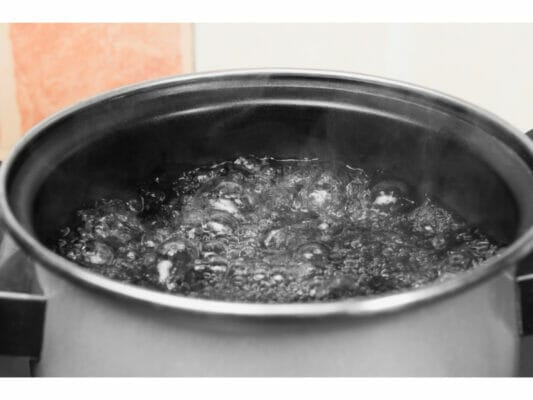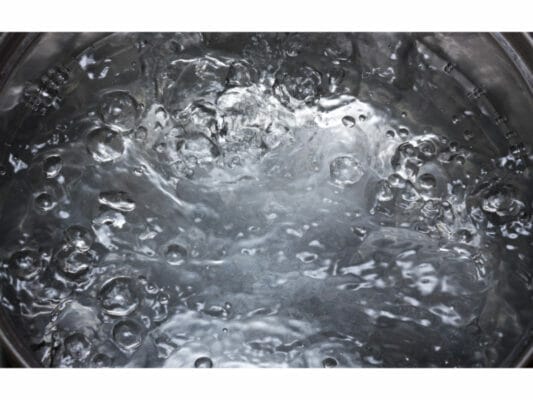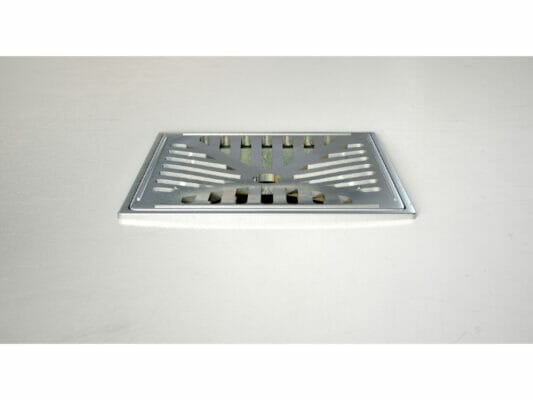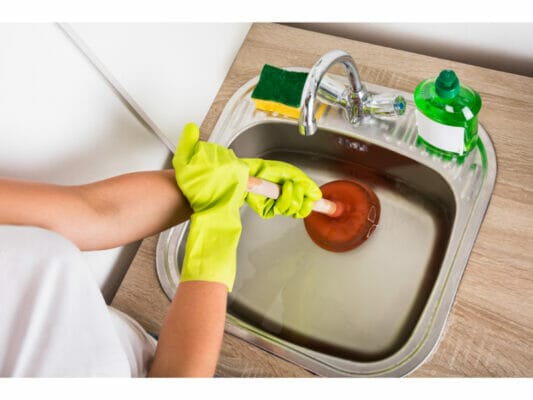Disclaimer: This post may contain affiliate links, meaning we get a small commission if you make a purchase through our links, at no cost to you. For more information, please visit our Disclaimer Page.
Clogging in the shower or sink drain is a common occurrence in most homes. And it is important to learn how to deal with the situation. However, is it ok to pour boiling water down the drain?
Pouring boiling water down the drain is not ok especially if the pipes are made of PVC. The water can destroy the plastic pipes by melting or loosening them. However, you can pour it on the metallic ones as they can withstand very high temperatures.

In this post, I’ll explore how boiling water affects a drain if used for unclogging. Moreover, you will also know whether it’s proper to use very hot water to clean your drains and many more. So, stick around to learn more!
Table of Contents
Does Boiling Water Damage PVC Pipes?
Boiling water can easily damage the PVC pipes.
And even if it seems like an easy way of unclogging your pipes, you shouldn’t opt for this method. It can lead to severe problems with the pipes since they can either soften or get loose.
In case you have recurrent troubles with slow-moving drains, and blockages, the deformed pipes can be the problem. You also need to know the heat limits for your pipes. As for the uPVC, which is majorly used for domestic installations, 80 degrees is recommended as the maximum temperature.
Boiled water can flow through the pipe. faster and causes it to melt. The wastewater will also cool instantly to a safer temperature. However, if water slows down because of partial blockage or a flat part of the drain, it’ll be in contact with trash for so long.
And this can lead to the pipes expanding and then melting. Apart from the deformation, it can make the pipe leak and inhibit the flow of water. This creates room for the blockages and the system can stop functioning.
What Temperature Can a PVC Pipe Withstand?
A PVC pipe can withstand a temperature of 140 degrees. Beyond this, the pipes are likely to lose their structural quality. However, the exact high-temperature limit can slightly fluctuate based on the actual specification of a pipe.
These types of pipes comprise a plastic known as polyvinyl chloride. The material is too versatile, and it’s simple to work with. Besides It is always a natural thing to see items expanding as the temperature rises.
And contracting while the temperature lowers. This isn’t an exception for the PVC pipes. The other factors affected are how stiff a material is and it’s capacity to maintain pressure. Still, these pipes are more common and are mostly used in plumbing tasks.
A standardized point of reference for the PVC pipe dimensions is always seventy-three degrees Celsius. Though a cold temperature cannot affect the strength of PVC piping. And as it continues to be warm, it can be extra pliable and will have little ability to carry fluid with a lot of pressure.
Is It Safe to Pour Boiling Water Down the Drain?
It is not safe to pour boiling water down the drain, mostly if it is made of PVC. It is always recommended that you avoid such acts. A majority of homes do have PVC pipes below their sinks and if the house is new, chances are it has them installed.
They cannot tolerate intense heat from boiling water. Besides, the pipes are attached using glue and this makes them vulnerable when you pour in the water. Even though you may not detect the damage instantly, the pipes do worsen with time.
You also need to think about your health. When you pour boiling water it can be dangerous as it may cause scalding or steam burn. The kind of material you pour the water on also matters and if your sink is porcelain, the heat may make it crack.
Even though you can find a solution to an unexpected issue affecting the drain, the water can lead to grease moving down the pipe. And it can glue to its sides. And when you constantly pour the boiling water, the volume of grease clogging the pipe will increase.
You may even need to call an expert for help at some point.

Will Boiling Water Clear a Drain?
Boiling water cannot clear the drain of all the clogs. Though it can dissolve substances like soap. As for the grease, even if it melts, it still sticks on the walls of the pipes, and this attracts clogging.
You can only pour the water if your drains are metallic since you cannot pour the water on PVC pipes. It can melt PVC or even soften them, causing more damage to your pipes. However, if the drain gets clogged with the ice cubes, the water can help to unclog the drain.
Still, the water can even propel the clog deeper in the pipes. This implies hair, grease, oil, or all of these can be hard to reach and eliminate. Although many people believe using the water can also clear a slow drain, this isn’t a good solution.
It cannot clear all types of clogs, and whatever people say are mostly myths. You may have heard the method worked for your friends, however, this does not mean the same technique can help you. There are lots of other perfect ways you can unclog your PVC pipes.
Plus you can also opt to reach out to a professional to help you if all other methods don’t work for you.
What Causes Shower Drain Blockages?
Drain blockages on a shower are normally caused by the accumulation of hair, dirt, and soap scum. Long hair specifically can clog the drains easily and it can get worse due to soap making the hair stick on the walls of the drains.
And as time goes by, the accumulation can hinder water discharge until the pipes are blocked.
Frequent clogging of your drains may signify a terrible blockage on the main sewer pipe. This can be the case if you encounter many clogs in your residence or even after you do multiple repairs. In this kind of situation, you can use boiling water to loosen up the clog if the pipes are metallic.
You can pour the water directly into the drain to stimulate the breaking up of the clog. And dissolving it if it comprises grease or soap scum.
Is Pouring Hot Water Down the Drain Bad?
Pouring hot water down the drain can be bad if it reaches boiling temperature. In such a case you may encounter the following issues;
Damaging the Pipes
In case the pipes beneath the sink are made of PVC as in most homes, it can only be able to withstand 140 degrees. Though it cannot handle more than that. In some places, boiling water is more than 200 degrees, which can affect pipes.
Also, the glue which connects the pipes is susceptible and can melt leaving them loose. If you’ve been pouring the water in your drains and didn’t notice any bad impact, you should realize that the damage may be gradual.
You May Get Injuries
When you move the water from your stove to the drains, you need to be careful as the water can burn you. Although you are likely to handle more boiling water as you make your meals, this doesn’t mean you are perfect at dealing with it. Especially when trying to unclog your pipe.
The Clog Can Go More Deeper
Very hot water can melt grease making it move down the drain and even stick on the sides of the pipe. Clog then goes on to build up and pouring more hot water can lead to it going deeper. At times, the water can cool before it reaches the clog, and it will remain there.
And if you cannot clear your drain, you will need an automatic drain cleaner. This will go down, reach the clog, remove it, and drag it along.
It Destroys a Sink Made of Porcelain
Pouring boiling water on your porcelain sink can lead to the sink getting cracks. This is because such kinds of sinks are not able to hold very high temperatures.
It Cannot Solve The Issues In a Sewer Line
Having hot water in your drains doesn’t mean it will remove the clog. At times the sewer system may need service if debris got in it. Thus, pouring hot water will not help out as it only pushes clogs farther.
And it will also cool down before getting there. Therefore, in case the drain is very slow then consider looking for an expert.

Can You Pour Boiling Water Down the Shower Drain?
You can pour boiling water down the shower drain only if the pipes are made of metal. The water temperature will help to dissolve the substances blocking the drain. For instance the gunk.
However, if they are PVC, then don’t even try it, as they can melt or even loosen. You can heat water in a pot that you can effortlessly carry when it is full. Remember, you will be transferring it to your bathroom and therefore you need to be careful.
You can then slowly pour water into your drain using a funnel. This will prevent the boiled water from damaging other parts of your tub. You’ll then need to wait for at least ten minutes and then try to run the cold water from your tap.
In case the clog consists of soap or even grease, it will meltdown. And if this technique doesn’t work for you, you can try another alternative.
How Can You Prevent Drain Clogs?
There are several ways you can prevent drain clogs. Some of them are as follows;
Using a Drain Trap
As for the shower drains, your hair can be the main reason behind the clogs. You can prevent this from happening by using a plastic or rubber drain cover. This is also a cheaper way to block the hair from the drain every time you are in the shower.
As for your kitchen sink, you can acquire a mesh trap and place it in there, so it can grab the large food particles for simple removal.
Ensure You Maintain the Drain Properly
When you clean the drains regularly, they’ll be in decent working condition. They will also not have bad smells. You can keep some baking soda or vinegar in your washroom.
Go on to pour them on the drain frequently and then proceed with pouring hot water mainly for the metallic pipes. And after brushing and having toothpaste down a drain, you can leave the tap running for a few minutes.
You can also do this for food debris as this will prevent it from settling around the drain surface.
Avoid Emptying the Dustbin in Your Shower
While you may be tempted to shake your rug or dustbin in the shower before washing them, this isn’t right. Debris and other dirt particles can collect and create a clog with time. Moreover, the things you should avoid disposing of on your sink are nuts, pits, seeds, and vegetable peels.
They all speed up build-up in a drain. Additionally, the cooking oil can coat the drains and can trap the food. And then lead to an irritable, hard-to-break accumulation.
How Often Should You Pour Boiling Water Down the Drain?
You should not pour boiling water down the drain. Not unless the drains are metallic. If not, you need to avoid that habit. Even though some do believe you can do it only once every week to avoid build-ups on the inner sections of the pipes, this isn’t right.
A single incident will not certainly destroy the pipes, but continuous habit is dangerous. However, if you are draining a bowl of boiled water from your food, you can leave your tap running.
You also need to scrape and rinse your dirty utensils using cold water before placing them in a dishwasher.
This enables the easy movement of the remaining greasy solids and you can use some warm water to emulsify them.
But as grease cools, it can solidify again and coat the drain and it will form a clog at some point. And in case your drains are made of PVC, they won’t be able to tolerate the boiling water.
If they consist of steel or copper you can go ahead and pour the boiling water. Though if they have rubber joints, they can get destroyed as they aren’t created to endure very high temperatures.

What Do You Do When Water Won’t Go Down the Drain?
You can try out the following techniques if water won’t go down the drain;
Use Boiling Water for Metallic Pipes
In any case, there aren’t any clues of whatever is clogging your drain, you can try pouring in boiling water. You can do this if you’ve tried using a drain snake and it hasn’t worked. Very hot water can help break down the soft accumulation.
For example, the cooking grease or soap scum around the edges of the drain. You can do this more than once.
Use Physical Means to Eliminate the Clog
If you can see and also access the clogs, then you can use your hands to remove them. Consider wearing rubber gloves before you proceed with this simple process. You can still use a wire to be able to get a little bit farther.
Use a Plunger on Your Sink
Apart from using a plunger on your toilet if it is clogged, you can also use it on the sinks. A cup-styled one can help you out if you need great function. This will cover the opening of the drain fully and hence establishing a rigid seal.
You can then make thrust upwards and downward, ensuring the seal is untouched. In case water flows after the process, then that’s it. And if not, you can redo the procedure.
Get a Drain Cleaner
You can use a natural cleaner as the traditional ones don’t normally function as required. They also have too many toxic chemicals. Baking soda or even vinegar will serve you well.
Though this depends on the nature of the clog. You can pour one cup of baking soda plus the same amount of vinegar into your drain. Then shut it with a rag or a drain stop.
Leave the mixture for not less than one hour, and finalize by rinsing with boiling water.
Remove the Drain Traps and Clean Them
A clog can also be fixed in a drain trap which is on the waste disposal under your sink. You can start by clearing the area and then placing a pail under the pipe to grab the runoff if any. Then you can use a wrench to help unfasten the nuts on each side of the drain pipe.
You can empty the drain in the bucket and then check if there are clogs. Tidy it up and then reconnect the pipe when done.
Opt for a Drain Snake
This is an adjustable tool used for drilling and is also called a plumber’s snake. You can use its hand to transmit a metal wire into the drain to pull the clog or break them down. You can also buy a disposable model made of plastic.
This won’t need cranking and you can try using it on your toilet. Ensure you clean it after use.
Conclusion
As noted, boiling water destroys PVC pipes and you can even get injuries in the process. It can also cause clogging which then results in backups and I bet you wouldn’t want that to happen in your home. Therefore, if you normally pour extremely hot water into the drains, then it’s time you stop the habit.
